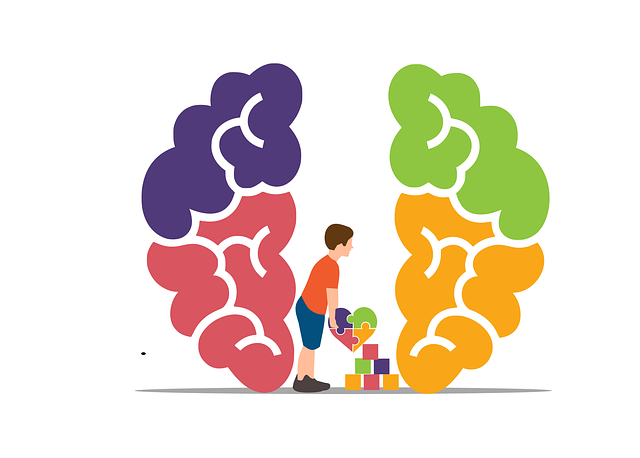Englewood Family Counseling Therapy stands out in the competitive mental wellness app market by prioritizing diverse target audiences and their unique journeys to improved mental health. They develop tailored campaigns addressing specific needs of busy professionals, students, and new parents, focusing on burnout prevention, confidence boosting, and accessible coaching programs. Leveraging user research and data analysis, they create practical support in relatable languages, fostering trust and enhancing emotional intelligence through a safe virtual space for open communication. By differentiating themselves with family-focused interventions and personalized healthy coping mechanisms, Englewood Family Counseling Therapy attracts users seeking lasting improvements in mental wellness and family dynamics. Their strategic marketing approach leverages social media platforms to normalize conversations around mental health, while continuous improvement based on KPIs like daily active users and session durations ensures the app's relevance and engagement, promoting positive outcomes.
In today’s digital age, mental wellness apps are transforming lives, with Englewood Family Counseling Therapy leading the way. This comprehensive guide explores a strategic marketing approach for such innovative solutions. We delve into understanding the target audience’s needs and pain points, crafting unique value propositions, and developing effective content strategies. By focusing on channel selection and user engagement metrics, this article equips professionals with tools to promote mental wellness apps successfully, ensuring Englewood Family Counseling Therapy stands out in a competitive market.
- Understanding the Target Audience: Identifying Needs and Pain Points for Mental Wellness App Marketing
- Crafting a Unique Value Proposition: Differentiating Englewood Family Counseling Therapy in a Competitive Market
- Channel Selection and Content Strategy: Effective Marketing Approaches for Mental Health Apps
- Measuring Success and User Engagement: Key Performance Indicators and Continuous Improvement for Mental Wellness App Marketing
Understanding the Target Audience: Identifying Needs and Pain Points for Mental Wellness App Marketing

Understanding your target audience is a cornerstone of any successful marketing strategy, especially for mental wellness apps. At Englewood Family Counseling Therapy, we recognize that each individual’s journey to improved mental health is unique. Therefore, our marketing efforts focus on pinpointing specific needs and pain points within diverse demographics. By delving into the challenges faced by busy professionals, students, new parents, or anyone struggling with stress and anxiety, we tailor our messaging to resonate deeply with these audiences.
This approach translates into targeted campaigns that address issues like burnout prevention, confidence boosting, and promoting accessible mental wellness coaching programs development. Through user research and data analysis, we identify common struggles and develop solutions that not only meet but exceed expectations. By speaking their language and offering practical support, our app becomes a trusted companion on the path to better mental health and well-being.
Crafting a Unique Value Proposition: Differentiating Englewood Family Counseling Therapy in a Competitive Market

In a competitive mental wellness market, crafting a unique value proposition is paramount for Englewood Family Counseling Therapy to stand out. While many apps offer generic coping skills development and mindfulness meditation techniques, Englewood Family Counseling Therapy must emphasize its distinct approach that goes beyond surface-level relaxation. By focusing on tailored interventions, the app should aim to empower users with confidence-boosting strategies specifically designed to address family dynamics and relationships. This personalized aspect is key to differentiating the service in a crowded digital space.
Englewood Family Counseling Therapy’s unique value lies in its ability to provide a safe, virtual space for families to navigate complex issues together. Through interactive tools and expert guidance, the app fosters open communication, enhances emotional intelligence, and promotes healthy coping mechanisms tailored to each family’s unique needs. By leveraging these differentiators, Englewood Family Counseling Therapy can attract users seeking not just temporary relief but lasting improvements in their family interactions and mental wellness.
Channel Selection and Content Strategy: Effective Marketing Approaches for Mental Health Apps

In the digital landscape, marketing mental wellness apps requires a strategic approach that resonates with the target audience seeking support for their emotional well-being. Channel selection plays a pivotal role in reaching potential users; platforms like social media, especially Instagram and Facebook, offer opportunities to connect with individuals actively searching for mental health resources. These channels facilitate engaging content delivery through educational videos, insightful blogs, and interactive live sessions featuring experts from reputable centers like Englewood Family Counseling Therapy.
Content strategy should focus on normalizing conversations around mental wellness, addressing common challenges, and offering practical solutions. Posts can highlight success stories of individuals who have benefited from various programs, such as communication strategies for improving self-esteem or the development of mental wellness coaching programs. By sharing valuable insights and tips tailored to different demographics, the app gains trust and positions itself as a reliable guide on the journey towards better mental health.
Measuring Success and User Engagement: Key Performance Indicators and Continuous Improvement for Mental Wellness App Marketing

Measuring success and user engagement is paramount for any mental wellness app marketing strategy. Key Performance Indicators (KPIs) should include metrics like daily active users, retention rates, and session durations to gauge how effectively the app is reaching and retaining its target audience. For instance, tracking consistent usage over time can indicate high user satisfaction and effective messaging, especially when aligning with goals like Resilience Building or Coping Skills Development.
Continuous improvement demands a data-driven approach, analyzing user behavior patterns to identify areas for enhancement. This might involve refining content to cater to diverse needs, such as providing tailored resources for specific demographics or integrating feedback from users and Healthcare Provider Cultural Competency Training to improve app functionality. Regular updates based on these insights ensure the app remains relevant and engaging, fostering longer user relationships and promoting positive mental health outcomes.
In developing a marketing strategy for mental wellness apps, such as Englewood Family Counseling Therapy, understanding the target audience’s needs and pain points is crucial. By identifying specific challenges related to mental health, the app can offer tailored solutions that set it apart in a competitive market. Effective channel selection and content strategies, including user-engaging content, are key to attracting and retaining users. Continuously measuring success through relevant KPIs enables continuous improvement and ensures the app remains relevant and beneficial for its users.














